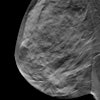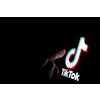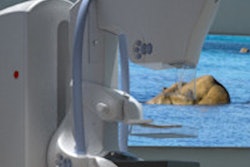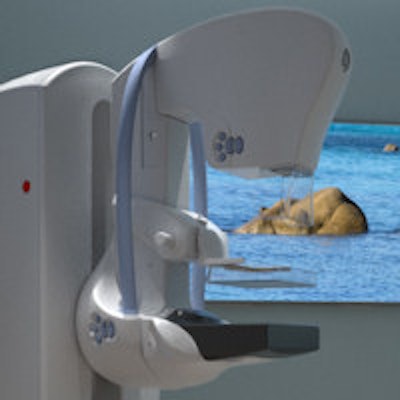
At least a quarter of women eligible for screening mammography avoid it because of fear of pain and anxiety, but this can be alleviated by adding soothing stimuli such as landscape scenes and aromatherapy to screening rooms, according to research presented at the National Consortium of Breast Centers (NCoBC) meeting in Las Vegas.
Shakira Sarquis-Kolber, director of women's imaging at Boca Raton Regional Hospital, and colleagues investigated the effect of sensory stimuli on women's perception of pain and anxiety during mammography exams. The group used GE Healthcare's SensorySuite package, which allows women to choose an environmental theme such as seaside, garden, or waterfall during the mammogram. The theme is presented via a 3D video played on two flat screens accompanied by soothing sounds. A light scent is released into the air through a diffuser.
"We realized we can't change the nature of the mammography exam, but we can change women's experience of it," Sarquis-Kolber told AuntMinnie.com. "Research has shown that if you engage two or more of a person's senses simultaneously, their perception of pain diminishes. And that's in fact what happened in our study."
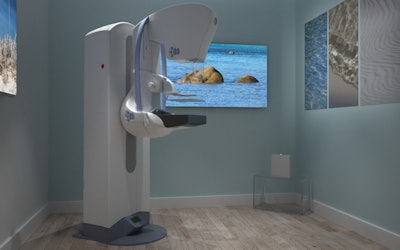 GE's SensorySuite concept upgrades mammography rooms with stimuli such as landscapes, aromatherapy, and soothing sounds.
GE's SensorySuite concept upgrades mammography rooms with stimuli such as landscapes, aromatherapy, and soothing sounds.Sarquis-Kolber's group included 167 patients in the study: 114 underwent mammography in a standard room and 53 had the exam in an upgraded "sensory stimuli" room. An initial group of patients were surveyed before the upgrade in a standard room, then the same questionnaire was given to a second group of women in the upgraded room.
The team compared the women's expected discomfort and anxiety at baseline with levels experienced during the exam, using a numerical scale from 0 to 10 (0 equaled no discomfort or anxiety, while 10 equaled the worst pain and most anxiety imaginable).
Of the women seen in the standard room, 16% had a history of breast cancer, compared with 21% of women in the upgraded room. The distribution of diagnostic versus screening exams was 25% to 75% in the standard room and 32% to 69% in the upgraded room. Most patients had received mammography before (98% in the standard room, and 96% in the upgraded room).
There were no differences between the groups in baseline anxiety level or expected discomfort, the researchers found. But after the mammography exam, discomfort and anxiety levels were significantly different between the two groups: Twice as many women who had their mammography exam in the upgraded room reported no discomfort at all, compared with those in the standard room (32% versus 16%, respectively). In addition, 51% of patients in the upgraded room reported no anxiety at all, compared with 36% of women in the standard room.
There may be additional benefits to the SensorySuite as well, according to Sarquis-Kolber.
"Our radiologists have reported that they're getting better images as well, with more tissue included, since women aren't as tense," she said. "We're planning to check our compliance rates after we've been using the SensorySuite for a year to assess whether it has had an effect on our screening compliance rates."
Aromatherapy helps relieve biopsy anxiety
In a related study presented this week at the NCoBC meeting, Alisa Domb, of the John C. Lincoln Breast Health and Research Center, and colleagues evaluated the effectiveness of aromatherapy for reducing anxiety in women undergoing stereotactic and ultrasound-guided core-needle breast biopsy.
The study included 135 participants who received aromatherapy via inhalation or topical application; the women chose between lavender or jasmine essential oils. Domb's group measured the anxiety of participants using the State-Trait Anxiety Inventory for Adults (a 40-question survey based on a four-point Likert scale; scores range from 20 to 80, with higher scores indicating greater anxiety). The team measured patient anxiety at baseline -- before the core-needle biopsy procedure -- and again after biopsy.
Of the 135 women, 66 received lavender aromatherapy and 69 receive jasmine. The overall mean baseline anxiety score was 40.9, higher than mean normative values for female working adults, according to Domb and colleagues. The overall mean anxiety score after the biopsy was 33, with little difference between the groups in terms of type of scent (lavender reduced anxiety by 18.6%, while jasmine reduced anxiety by 19.6%).
The study findings suggest that a fairly simple intervention such as aromatherapy can reduce women's anxiety levels at biopsy.
"Our results were comparative to other studies evaluating complementary/alternative modalities for anxiety reduction during breast biopsy procedures," the researchers concluded.

